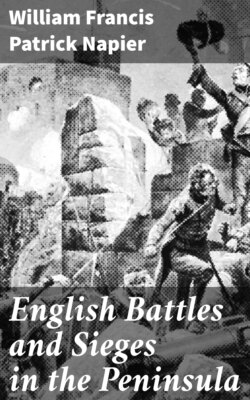Читать книгу English Battles and Sieges in the Peninsula - William Francis Patrick Napier - Страница 8
На сайте Литреса книга снята с продажи.
BOOK II.
ОглавлениеTable of Contents
Passage of the Douro—Talavera—Combat of Salinas—First Combat of Talavera—Second Combat of Talavera—Battle of Talavera.
Napoleon having failed to cut off the English army, returned to France, leaving precise instructions with his lieutenants for the invasion of Portugal. Marshal Ney, who reached Coruña three days after the battle, was to hold Gallicia. Soult was to march by Oporto upon Lisbon. General Lapisse, previously directed on Ciudad Rodrigo with twelve thousand men, was to connect Soult’s invasion with another, to be conducted south of the Tagus by Marshal Victor, who had thirty thousand troops. Soult had twenty-five thousand, and, after several battles with the Portuguese of the northern provinces, stormed Oporto in March; but he could hear nothing of Lapisse or Victor, and, his own progressive strength being then exhausted, he endeavoured to establish himself solidly until new combinations could be formed.
Lapisse took no pains to open a communication with Soult, and after several weeks of inactivity suddenly made for Alcantara, crossed the Tagus there and joined Victor. The Portuguese and Spaniards, thinking he was flying, rose along his line of march on both sides of the frontier and cut off all communication between Victor and Soult. The former was however little disposed to act. He had defeated the Spanish general Cuesta in a great battle at Medellin, and only accidentally failed to obtain Badajos by treason; but then he took quarters at Merida, sullenly resistant of his orders to enter Portugal. This enabled Cuesta, who had all the resources of Andalusia, to reappear in Estramadura with an army of thirty thousand infantry and six thousand cavalry—and at the same time a new force sprung up in Portugal.
Previous to this period the English ministers, without resolution or capacity to adopt any judicious course, at one time looking to Portugal, at another negotiating for the occupation of Cadiz, had during these events displayed only infirmity of purpose and ignorance of the real state of affairs; but after four months of vacillation, subsequent to the battle of Coruña, they decided to act in Portugal, where the Regency had accepted General Beresford as their field marshal. The British troops in that country were then largely reinforced, and Sir Arthur Wellesley, assuming the supreme military command of both nations, commenced that series of victories which has placed him amongst the truly great generals of the world—and they are few, though the vanity of nations would make them many.
Soult was then in Oporto, Victor at Merida, but the frontier insurrection debarred all intercourse between them; and Sir Arthur, after making arrangements to cover Lisbon from Victor, marched against Soult, in whose army there was a conspiracy of officers to deliver him to the English. One D’Argenton twice secretly visited head-quarters on this subject, yet the treason, though of weight as an accessory, was not permitted to affect the British preparations or movements, which were carefully concealed.
On the 7th of May Beresford was detached with a mixed force, six thousand being Portuguese, to operate on the side of Lamego.
On the 8th, sixteen thousand British troops, fifteen hundred being cavalry, with twenty-four guns, moved from Coimbra under Sir A. Wellesley’s personal command towards the Vouga river.
Up to this time Soult was ignorant that such a force had been assembled, but hearing nothing of Lapisse or Victor he had decided to make a flank march into the Salamanca country, and had pushed his light cavalry under Franceschi to the Vouga, supporting it with Mermet’s division of infantry. Loison’s division, six thousand strong, was then beyond the Tamega at Pezo de Ragoa, and Lorge’s heavy cavalry was on the Lima, watching the Portuguese insurgents.
In this scattered state the French on the Vouga were surprised and driven fighting upon the Douro, which they crossed in the night of the 11th and destroyed the boat bridge. Soult, who had discovered the conspiracy on the 9th, was thus suddenly beset with perils. Treason in his army which he could not probe, a powerful enemy suddenly springing up in front, an active insurrection on his rear; his troops parcelled from the Vouga to the Lima and Tamega, and under officers necessarily suspected while the extent of the conspiracy was unknown! He did not quail. Directing Lorge to abandon the Lima and make for the Tamega, he ordered Loison to hold Amarante on that river, as the only means of concentration and safety for the army; he sent his stores and most of the heavy guns towards that place on the 10th and night of the 11th; and when the troops from the Vouga came pouring in, the remaining heavy guns and the baggage were also put in movement, Mermet’s division following them as far as Vallonga, with orders to secure the boats on the Douro and vigilantly patrol up the bank. All the craft from Oporto to the mouth of the river was then drawn to the right bank, guards were set, and Soult, thinking his position secure, decided to hold Oporto another day, to give Lorge’s dragoons and other detachments time to reach Amarante: he was however curiously misled. In the recent operations, an English column, moving in boats up the Lake of Ovar, which runs parallel with the coast, had disembarked on Mermet’s flank, who thought it had landed from the ocean; hence Soult, expecting the empty vessels would enter the Douro to effect a passage, directed his attention entirely to the lower river, while on the upper his orders were neglected and false reports made of their execution, for the conspirators were many and busy.
